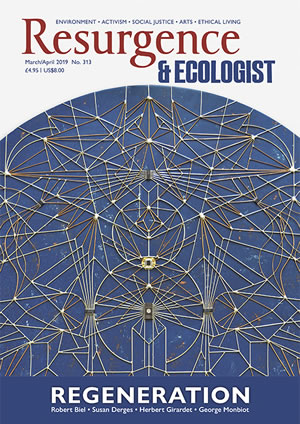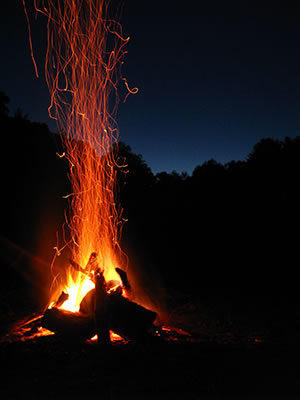Those of you who have come across Mac Macartney, founder of Embercombe – the leadership and education centre in Devon – will know that he is a world-class storyteller who communicates with power and profundity. The Children’s Fire, about his midwinter pilgrimage across Britain, is so much more than one man’s quest. It’s our story: the story of Britons, Europeans, Indigenous and all Earth people. It’s also a story about the epicentre of Druidic Celtic society, the holy isle of Mona (Anglesey), revered by Britons, feared by Rome.
This small, accessible book is a portal: a way into subconscious recesses; a reverie of immense relevance to today’s malaise; a portrayal of humanity’s innate desire to live with meaning; and our search for the sacred grail, to see with new eyes.
Mac Macartney has spent his life on such a quest, a life rich with tumbling twists and tales of courage and fear, threshold crossings and new beginnings. He was mentored by Indigenous elders over many years and has acquired profound insights into the questions of our time. His life passion is to share a new narrative of sustainability, awakening a fresh yet ancient story about how we become more human in our more-than-human world: “All parts of the emerging new story are about integration, collaboration, inclusion and wholeness … We have to bring all of Nature to our altars, and acknowledge the sacred in ordinary, everyday living … We are being asked to imagine ourselves anew, to accept and grow our talents without collapsing into the arms of hubris.”
Deep within the story of Britain – and the west – is a psychic wound. This wound needs to be aired and attended to for healing to occur. Through the pages we reach upstream to sense the fecund cosmology of our animist past, and swim downstream to today’s pathology of our psychology. There is prescient wit and wisdom at every turn. It’s a floor-stomping rage of a read that throws anthropocentric materialism to landfill.
The antidote to today’s malaise: the Children’s Fire – elegant in its simplicity and pragmatism. It’s a pledge each of us can make deep in our hearts, if we dare comprehend the implications. It originates from Native American chiefs: “No law, no decision, no commitment, no action, nothing of any kind will be permitted to go forth from this council that will harm the children, now or ever.” The time has come to rekindle the Children’s Fire, and dare to make this pledge.
Beware, though: this book is not for the faint-hearted. It’s radical and raw. But if you wish to experience a gruelling, gut-wrenching quest in the comfort of your armchair, nested next to the fire, around the hearth, it’s one for you. I shall give the final words here to the author:
“We are a people walking home. We are searching the threads of a broken and forgotten story. It may be new, but in most respects I think it is the renewal of something that we once held close to our hearts and vivid in our imagination … [where] we allow the full recognition of sacredness in all aspects of life and living – then, then we will skim the voyage across the water to the far shore.”







